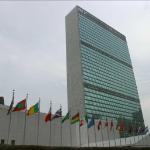Hijacking the UN's Human Rights Mission
 A new report by UN Watch highlights how repressive regimes on the UN Human Rights Council have undermined the agenda to protect human rights and used the body instead to vilify Israel.
A new report by UN Watch highlights how repressive regimes on the UN Human Rights Council have undermined the agenda to protect human rights and used the body instead to vilify Israel.
The Geneva-based NGO UN Watch has released a new report highlighting the UN Human Rights Council’s (UNHRC) most significant shortcomings. It demonstrates how allowing countries with poor human rights records to become members has undermined the council’s mandate to protect human rights. The report recommends the United States assert its leadership to stem the current abuses being generated.
In the report, UN Watch examined the 30 key votes by the council for the 2008 – 2009 cycles. Only 13 out of the 47 members were rated as having a positive voting record. The 34 members that had a negative voting record cast ballots against basic principles such as free speech and adopted resolutions that supported repressive regimes. Those countries given the poorest rating included Russia, Saudi Arabia, Cuba, Pakistan, China, and Egypt.
The irony is that the UNHRC was established in 2006 to replace the failing United Nations Commission on Human Rights (UNCHR). The CHR was notorious for politicized decisions, an anti-Israel bias, and having its members fail to deal with human rights abuses within their own country. The HRC has similar problems because of its membership.
According to the report, 51% of the HRC’s 47 members are non-Democratic countries. In practice, the council’s agenda is controlled by Islamic and African states with China, Cuba, and Russia ensuring that they are immune from human rights’ criticism. The report concludes that the council’s agenda is not the protection of human rights but the political protection of each member. A typical case in point was a Cuban sponsored resolution that was overwhelmingly adopted in 2009 which allowed governments (not the people) to have the right to decide on their political, economic, and social system.
The finding of the report proved the anti-Israel bias of the council. The council passed 33 “condemnatory resolutions” and 27 of them condemned Israel. Meanwhile, Hamas, Hezbollah, and other violators enjoyed exculpatory immunity. One example that stands out is a resolution that called for Israel to lift its checkpoints in the Palestinian territories but never addressed the human rights issue of stopping suicide bombing attacks.
Another outrageous resolution to anyone supporting human rights was the Pakistani resolution overwhelmingly adopted in 2008. It alleges that Western governments have waged a campaign against Muslim minorities in which they exploit 9/11 in order to persecute Muslims. Furthermore, it does not mention the plight of non-Muslims living in predominantly Muslim countries.
The report made a number of recommendations for the United States and urged it to take a leadership role in refocusing the work of the council. Ultimately, someone needs to have the council members act in accordance with why the HRC was established: to protect human rights as an objective body.